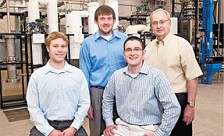Former ISU students put biomass research to use

Three former Iowa State University graduate students are reaping the benefit of working hard in school.
In the process, they hope to have a technology that can commercialize biomass, which is classified as any plant material such as grass, wood chips or corn stover.
Cody Ellens, Anthony Pollard and Jared Brown were pulled aside by Iowa State distinguished professor in mechanical engineering Robert Brown after a presentation in 2008. Brown told them they should consider starting a company using fast pyrolysis technology.
“It was surprising, to say the least,” Ellens said. “I hadn’t put much thought into doing something like this before.”
Thus started Avello Bioenergy Inc., which recently demonstrated the use of Bioasphalt – one of its products made using fast pyrolysis technology – on the Waveland Trail in Des Moines between Franklin Avenue and University Avenue.
Robert Brown has been studying fast pyrolysis, the process of converting biomass into bio-oil, biochar (a type of charcoal) and other substances, since the 1980s. His former graduate students licensed his research and their own to come up with a way to recover the bio-oil as several fractions (substances) with different properties. In doing this, Avello is able to increase the usefulness of the bio-oil by producing specific products like Bioasphalt, Biofuel Oil and synthetic gasoline.
“Almost everybody collects bio-oil as one fraction and then tries to figure out what to do with it,” said Dennis Banasiak, president of Avello. “It’s acidic, it’s unstable, it’s very hard to work with, and it’s been a huge challenge. Our piece of technology gets around a lot of those problems.”
From idea to start-up
Ellens, Pollard and Jared Brown took the idea seriously almost from the get-go. With more than a year to go in graduate school, the students, now co-founders of the company, were able to develop a business plan without the immediate pressure of starting a business.
They took their ideas to the John Pappajohn Entrepreneurial Center on campus, came up with a business plan and entered it into competitions to get as much feedback as possible. In late spring 2009, they submitted a proposal through Iowa State to a U.S. Department of Energy solicitation. The students weren’t awarded anything, but the experience gave them a direction to follow.
“That was the first time where we thought this might actually work out,” Ellens said.
Avello did receive a $150,000 demonstration grant from the Iowa Department of Economic Development and $5,000 from the 2009 statewide Pappajohn New Venture Business Plan Competition. The bulk of the start-up funding came from Equity Dynamics Inc. in Des Moines, Banasiak said, though he declined to say how much Avello received.
The company isn’t the first to spin off from ISU students’ research, Robert Brown said, but it is among the first.
“Some schools have a great reputation for doing this,” he said. “It’s something we’re still learning to do at Iowa State University. I think a lot of students are inclined to be entrepreneurial, but they don’t know how you launch such an activity, and they’re not sure where they get those big ideas and those opportunities.”
For Avello, it was a matter of taking something students were already working on in a laboratory and translating it to a business opportunity. Ellens said Avello was less of a model and more of an example of how to put technology that students are developing in school into a real-life application.
“There are a lot of students out there that are working with pretty promising technologies and developing them in the lab,” Ellens said. “That’s the goal of the research that a lot of these people are doing, is to get it out in real-world applications. … You want to see the real economic benefit, the real social benefit of these technologies.”
Company has big ideas
So far everything Avello has done has been on a small testing scale.
The company leases space at the university’s BioCentury Research Farm west of Ames, and leases time on a small-scale recovery system for the bio-oil that Pollard helped create.
Among the bigger accomplishments in the first year of business was running the pyrolysis system continuously for five days in a row on two separate occasions. Through that, Avello was able to produce Bioasphalt, using research done by ISU professor Christopher Williams.
Seeing the Bioasphalt put into use on the Des Moines bicycle trail was gratifying for the company.
“Now we can actually point to something,” Ellens said. “It’s not just all on paper. It’s not all theoretical anymore.”
The future is all about taking progressively bigger steps.
First, Avello is trying to raise money to build a demonstration unit that can process 2.5 tons of biomass per day, with the goal of making enough material to prove the process can work on a larger scale. The project is projected to cost $8 million, and the company already has a commitment for more than $5 million from outside funds.
If the demonstration works as expected, the next step will be to start building a commercial plant within a couple of years.
“That’s the next step in commercialization and technology – doing it on a larger scale,” Banasiak said.











